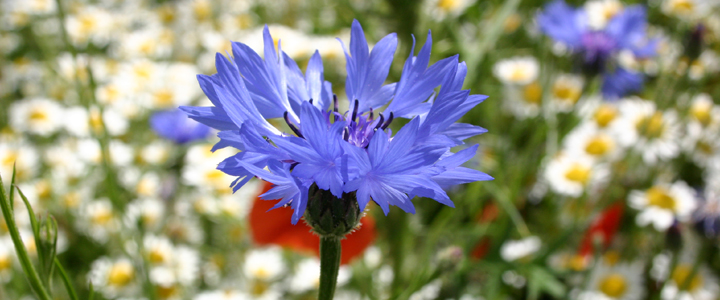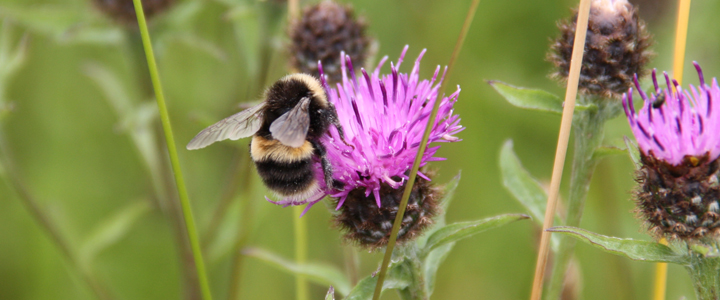
An overview
We all know that wildflowers are essential and they have been growing in popularity for the past 20 years, which is
excellent news, as we have lost over 97% of wildflower meadows from the 1930s up to the 1980s.
The collective progress made since then is unclear, but what is clear is that we need to continue creating
wildflower meadows of any shape and size to fulfil the needs of our local eco-system.
A significant contribution made by native wildflowers is to modern medicine as certain wildflowers contain
compounds used in medicine such as self-heal which has antibiotic properties and foxgloves which contain chemicals
used in the treatment of heart disease. These are just two examples, there are many more examples available and
still more to discover.
A big job that wildflowers undertake is to provide bees, butterflies and other pollinators with food sources
throughout the seasons, and that is why a wide range of wildflower species are required.
Our favourite fruits and vegetables such as apples, strawberries, raspberries and more, rely on pollinating to
produce a good crop. This job carried out by pollinators that depend on wildflowers; without them, we would require
artificial pollination, which is time-consuming and very costly.
Pollinators also help fight against crop pests, which are insects that cause damage to crops and plants. Without
pollinators carrying out those battles, farmers would have to rely on pesticides even more, which would yield
negative consequences for everyone.
Finally, wildflowers provide the countryside with beauty and memories as wildflowers bring back fond childhood
memories and certain species such as poppies remind us of the fallen soldiers that lost their lives in
combat.
Wildflowers and the environment

Starting from the roots, alongside the medicinal properties that can be found, established wildflower meadows have
very stable soil due to the complex root systems formed by wildflowers. This allows the soil to handle heavy
rainfall without losing nutrients and having them washed away to the nearest water system. An excess of nutrients in
a water system causes algal blooms (algae) which use up all the oxygen in the water, leaving none for other marine
life such as fish.
Wildflowers provide pollinators and insects with food from leaves, pollen, nectar, shelter and places to breed.
Pollinators then return the favour by transferring pollen, enabling the wildflowers to develop seeds that produce
more flowers.
Wildflowers are beneficial during the winter also. As food is scarce in the countryside, wildflower seeds become an
important food source for birds and small mammals.
Native and non-native wildflowers.
Native wildflowers have evolved alongside native wildlife over hundreds of years developing shapes, sizes, colours
and scents which attract native pollinators. The flowering times are also suited to native pollinators with some
insects being very picky about where they get their food and need certain native wildflowers to survive.
Non-native species can pose a risk to native wildflowers as they can introduce diseases and compete for resources
such as space, insect pollination and water.
Crossbreeding can occur between native and non-native species of wildflowers which can interfere and modify
adaptions that native species have evolved over hundreds of years. This dilutes the benefits that
native wildflowers have developed. A popular example of this occurrence is the hybrid bluebells that
formed when the Spanish bluebell was introduced, making it now rare to find areas where only native
bluebells grow.
Non-native wildflowers can dominate their environment, making them difficult to remove and able to produce
self-sustaining populations quickly. This can lead to non-native species out-competing native species and
threatening local wildflower populations.
How to help native wildflowers.
Helping native wildflowers is a case of every little helps, as it is challenging to create vast wildflower meadows
without significant support and large expanses of land, especially in urban areas.
Pollinators are not able to travel too far to find food, making it especially important to provide food sources and
shelter dotted around for them to visit and use. The importance is amplified in urban areas where there are very few
sources of pollen and nectar.
Sharing is always important, so telling your friends and family about the importance of wildflowers or buying them
a small pack of seeds as a gift is an excellent thought and will also help our native wildflowers. Families can have
fun creating seed bombs together and throwing them around bare patches in the garden for a fun afternoon that helps
a vital mission.
Buy and gift
our wildflower mixtures here.






